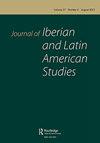Introduction: Social reform, Gender and Sexuality: recent historical approaches to the origins of the welfare state in Spain
IF 0.3
0 HUMANITIES, MULTIDISCIPLINARY
Journal of Iberian and Latin American Studies
Pub Date : 2023-01-02
DOI:10.1080/14701847.2023.2184012
引用次数: 0
Abstract
The articles in this special issue have been conceived as contributions to broadening knowledge on the origins of the welfare state and social citizenship in Spain from the late nineteenth century to 1936. 1 Drawing on new theoretical approaches and different fields of historical study, our aim is to highlight and explore aspects of this process that have been insufficiently analyzed to date. Specifically, the authors pay attention to cultural breaches and conceptual frameworks that underlay this process and generated new individual and social identities and behaviours. The contributions to this special issue are two-pronged. On the one hand, they question the widespread belief that welfare states arose as a result of socioeconomic transformations or undertakings by one political – ideological current or another. An alternative explanation is developed through their exploration of the crisis experienced by the classical liberal model of society and the new notions of the social as causal factors in shaping social reform policy. On the other hand, some of the articles will specifically focus on the pivotal role played by these mediations: discourses on gender and sexuality as constitutive elements of emerging visions of the social and society in the construction of social reform projects. As Marie Walin puts it, “the dark side of social reform” produced subjects whose exclusion from the category of social citizenship was articulated around notions of gender and sexuality that were open or subtly grounded in historical hierarchies. Finally, given that hygiene and eugenics were embedded in social reform from the outset, their specific function in the process under analysis will be disentangled.引言:社会改革,性别和性:西班牙福利国家起源的近期历史方法
本期特刊的文章被认为是对拓宽对19世纪末至1936年西班牙福利国家和社会公民起源的认识的贡献。利用新的理论方法和不同的历史研究领域,我们的目标是突出和探索迄今为止尚未充分分析的这一过程的各个方面。具体来说,作者关注的是文化突破和概念框架,它们是这一过程的基础,并产生了新的个人和社会身份和行为。本期特刊的投稿是双管齐下的。一方面,他们质疑人们普遍认为的福利国家是社会经济转型或某种政治意识形态潮流的结果。另一种解释是通过他们对古典自由主义社会模式和社会作为形成社会改革政策的因果因素的新概念所经历的危机的探索而发展起来的。另一方面,一些文章将特别关注这些调解所起的关键作用:在社会改革项目的建设中,将性别和性作为新兴社会愿景和社会的构成要素的话语。正如玛丽·瓦林(Marie Walin)所说,“社会改革的阴暗面”产生了一些被排除在社会公民范畴之外的主体,这些主体围绕着性别和性的概念,这些概念是开放的,或者是微妙地植根于历史等级制度。最后,鉴于卫生和优生学从一开始就嵌入到社会改革中,它们在分析过程中的具体功能将被解开。
本文章由计算机程序翻译,如有差异,请以英文原文为准。
求助全文
约1分钟内获得全文
求助全文
来源期刊

Journal of Iberian and Latin American Studies
HUMANITIES, MULTIDISCIPLINARY-
CiteScore
0.40
自引率
33.30%
发文量
23
 求助内容:
求助内容: 应助结果提醒方式:
应助结果提醒方式:


